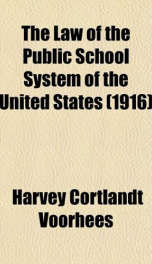the law of the public school system of the united states

Purchase of this book includes free trial access to www.million-books.com where you can read more than a million books for free. This is an OCR edition with typos. Excerpt from book: and as these depend on spreading the opportunities and advantages of education in the various parts of the country, and among the different orders of the people, it shall be the duty of legislatures and magistrates, in all future periods of this commonwealth, to cherish the interests of literature and the sciences, and all seminaries of them; especially the university at Cambridge, public schools and grammar schools in the towns; to encourage private societies and public institutions, rewards and immunities, for the promotion of agriculture, arts, sciences, commerce, trades, manufactures, and a natural history of the country; to countenance and inculcate the principles of humanity and general benevolence, public and private charity, industry and frugality, honesty and punctuality in their dealings, sincerity, good humor, and all social affections and generous sentiments, among the people." The Constitution of the United States does not mention the right or duty of education, and it therefore would seem beyond the power of the Federal government to prescribe, limit or regulate the common schools of the several States.1 And although a treaty to that effect would be valid in favor of a foreign power, it would not be binding upon the States, except as a consequence of the war power.2 In New York, there is no constitutional right to education, the right being founded entirely upon legislation, and as such is subject to such limitations 1 Marshall v. Donovan, 10 Bush (Ky.) 681; Griswold v. Hepburn, 63 Ky. 20; Tucker's Limitations on the Treaty-Making Power, 21, 380. 2 Stimson's Const, b. Ill, sec. 50. chapter{Section 4as the legislature in its wisdom, may from time to time see fit to make.1 § 4. What is a School? A school is an institution of learning of a lower grade ...
Info about the book
Author:
Series:
Unknown
ISBN:
1594607400
Rating:
4.5/5 (2)Your rating:
0/5
Languge:
English
Users who have this book
Users who want this book
What readers are saying
What do you think? Write your own comment on this book!
write a commentif you like the law of the public school system of the united states try:
Other books by this author
Do you want to exchange books? It’s EASY!
Get registered and find other users who want to give their favourite books to good hands!


